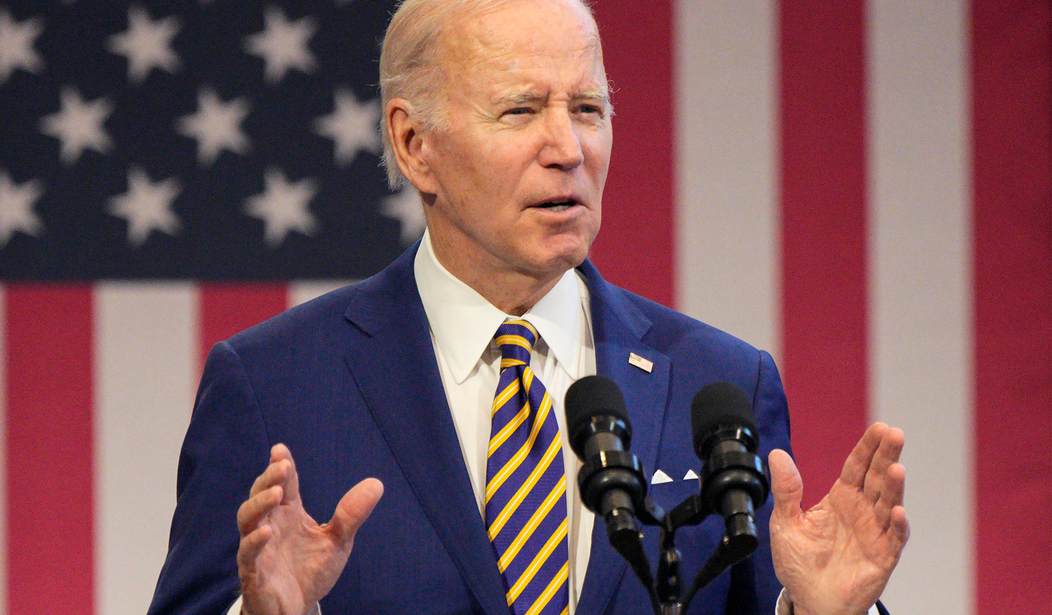By Chris Talgo
We are just past the halfway point of President Biden’s first term and suffice to say, things are not rosy on the economic front.
From a macroeconomic perspective, Biden’s policies have unleashed massive inflation, added nearly $5 trillion to the national debt, precipitated huge interest rate hikes, and rallied countries to consider dropping the dollar as the world’s reserve currency.
On a personal level, Biden’s reckless spending, asinine energy policies, overregulation, and absolute obsession with environmental, social, and governance (ESG) scores and diversity, equity, and inclusion (DEI) initiatives are causing an acute case of economic anxiety among the vast majority of Americans.
According to a new poll conducted by CNBC and Momentive, a whopping 58 percent of Americans describe themselves as living “paycheck to paycheck,” including 32 percent of households with more than $100,000 in annual income.
What’s more, 70 percent of Americans are chronically “stressed” about their personal finances. Incredibly, almost eight in 10 American households making less $100,000 per year are “stressed” about their financial situation as are close to 60 percent of households earning more than $100,000 annually.
Interestingly, more than half of those polled, 52 percent, are currently more stressed about their personal finances than they were at the beginning of the pandemic in March 2020, when the economy was literally on the brink of total collapse.
Unsurprisingly, nearly 60 percent of Americans identify “inflation” as public enemy number one when it comes to their financial stress. Coming in at number two was “Economy-wide instability,” followed closely by “Interest rates rising,” and “Lack of savings.”
The “lack of savings” cohort includes 53 percent of the population, who say they have “no” emergency fund. However, among those who actually do have a rainy-day fund, 40 percent say it is less than $10,000.
Recommended
In short, as the data demonstrate, the overwhelming majority of Americans are struggling to make ends meet on a monthly basis, which certainly does not bode well for the future.
Yet, the data also tell another story, one that has been largely ignored for the past few decades, and that is the steady decline of America’s once-thriving middle-class.
For example, in 1971, 61 percent of American families were considered middle-class based on their income. By 2021, that number had dropped to 50 percent.
In all fairness, the decline in middle-class America has been occurring for many years, under Republicans and Democrats.
However, during the first few years of President Trump’s administration (before the pandemic), the American middle-class (and working-class) was in the midst of a renaissance unseen in this nation for many years.
For instance, under Trump, “Low- and middle-class families saw the largest gains in wealth growth in 2018 and 2019, according to the Federal Reserve. Low-income families saw their net worth increase 37%. Middle-class families saw their net worth increase 40%.”
Moreover, “Real median U.S. household income in 2019 rose nearly 50% more than during the eight years of Barack Obama’s Presidency. Median household incomes increased 7.1% for Hispanics, 7.9% for Blacks,10.6% for Asian Americans and 8.5% for foreign-born workers.”
Unlike Biden and Obama, Trump’s economic agenda focused on lowering the overall tax and regulatory burden for all Americans, which spurred economic growth and innovation.
Also, unlike his predecessor and successor, Trump’s common-sense energy policies lowered the price of energy across the board, which is a boon for middle-class households. On the other hand, due to Biden’s fixation on unaffordable and unreliable green energy, the average American household is now paying an extra $2,300 in energy costs.
Of course, critics will say that Trump added trillions of dollars to the national debt and he handed Biden an economy in meltdown mode. But, the only reason the national debt exploded under Trump’s watch was because of the pandemic. And, Trump gave Biden an economy in rapid rebound, with low inflation, robust job growth, and no need for more stimulus spending.
Yet, despite the beginnings of a middle-class resurgence under Trump, Biden came into office and immediately took a wrecking ball to middle-class America.
Biden’s lavish spending has fueled out-of-control inflation. Biden’s anti-energy policies (not Putin’s invasion of Ukraine) have caused prices at the pump to skyrocket. Biden’s tax hikes and onerous regulations have inhibited economic growth. And, Biden’s “whole-of-government approach to advancing equity” has supplanted meritocracy in favor of racial quotas and other nonsense.
In 1992, when America was in the depths of a recession, political strategist James Carver, who was working for the Bill Clinton campaign, coined the term, “It’s the economy, stupid.” Later that year, Clinton beat incumbent President George H.W. Bush because most voters agreed with Carver and desired economic changes.
In 2024, we could see the long-awaited reboot of the “It’s the economy, stupid” movie. The big question is: Will it have a happy ending, like in 1992, when President Clinton eventually balanced the budget, reformed welfare, and cut taxes with the help of a Republican-led Congress? Or, will we see an alternative ending, in which the national debt keeps growing, inflation keeps rising, and Americans’ financial stress becomes even worse than it already is?
Chris Talgo (ctalgo@heartland.org) is editorial director at The Heartland Institute.

























Join the conversation as a VIP Member